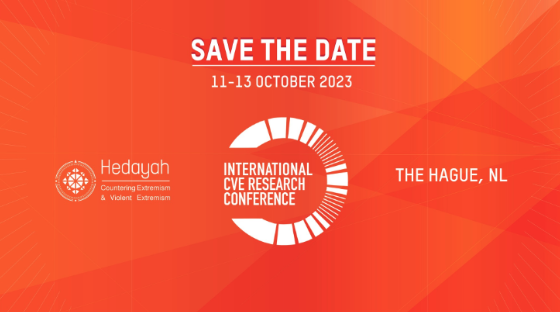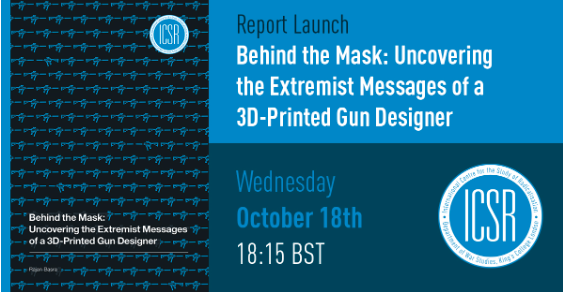Welcome to the September edition of the Global Network on Extremism and Technology (GNET) research digest.
Your digest contains a selection of relevant news, research, academic journal articles, and GNET Insights relating to terrorist use of technology.
Hedayah’s Eighth Annual International Countering Violent Extremism Research Conference

Where: The Hague, The Netherlands
When: Wednesday 11 October – Friday 13 October
Hedayah’s Annual International Countering Violent Extremism (CVE) Conference convenes CVE researchers, practitioners, and policymakers to share the most current, up-to-date research and analysis of CVE on an international scale, and provides a platform for network members to meet and share good practices on drivers of radicalization and effective solutions.
GNET is proud to be hosting a panel, Extremist Exploitation of AI & Alt-Tech: Emerging Trends, and Implications for Intervention, featuring esteemed GNET contributors from around the world.
To register, or for more information, please contact Hedayah at [email protected]
ICSR Report Launch: Behind the Mask: Uncovering the Extremist Messages of a 3D-Printed Gun Designer

Where: King’s College London
When: Wednesday 18 October @ 18:15 BST
This new ICSR report reveals the digital footprint of the world’s most influential 3D-printed gun designer. His gun design has been seen across five continents, yet little is known about the person behind the mask. Using an innovative open-source methodology, this report uncovers – for the first time – his incel worldview, extreme right-wing beliefs, and endorsement of terrorism, and highlights remarkable details about his online and offline life. This report was written by ICSR Senior Research Fellow Dr Rajan Basra.
Call for Papers – The Future of Conspiracy Scholarship: New Epistemologies and Imaginaries
Special Issue Editors Zelly C. Martin, Inga K. Trauthig, Alice E. Marwick and Samuel C. Woolley invite full paper submissions for a special issue of Journal of Information Technology & Politics (JITP) on new epistemologies and imaginaries in conspiracy theory scholarship.
This special issue aims to push the boundaries of conspiracy studies beyond extant work, which primarily focuses on the alt-right, health, and Western understandings of conspiracy (Halafoff et al., 2022; Mahl et al., 2022, 2022; Marwick et al., 2022). We answer calls to expand understandings of conspiracy beyond Western epistemology (Mahl et al., 2022) to contribute to a fuller conceptualization of “conspiracy-believing” (Parmigiani, 2021). We examine the troubling content and implications of conspiracies in a manifold manner while acknowledging their potentially harmful impact. We invite those interested in conspiracy as it applies to epistemology, knowledge production, technological artifacts, gender/race/class, and reception, inter alia. Importantly, papers must engage with technology and political communication scholarship in some form.
Academic Papers
Alexander, Andrew & Hongbin Wang (22 September). Topological Data Mapping of Online Hate Speech, Misinformation, and General Mental Health: A Large Language Model Based Study. Machine Learning.
Munn, Luke (12 September). Toxic play: Examining the issue of hate within gaming. First Monday.
News Articles
Neate, Rupert (2 October). Monday briefing: What is the cause of Sweden’s ‘terrorist-like’ epidemic of violence?. The Guardian.
Gambini, Bert (26 September). Patterns in terrorist propaganda can provide foundation for effective counter messaging. UB Now: University of Buffalo Research News.
Taylor, Josh (26 September). X/Twitter scraps feature letting users report misleading information. The Guardian.
Ware, Jacob (26 September). The Southern Border Poses Terrorism Risks. Homegrown Threats Still Loom Larger. Council on Foreign Relations.
Libre, Matin (25 September). Benin/Violent extremism: UNDP raises awareness among young people of the risks of indoctrination. Jumelages & Partenariats.
Naughtie, Andrew (25 September). German far-right extremism on the rise as Holocaust memorial sites defaced. Euronews.
Tavares, Paula & Gustavo Borges (19 September). Disinformation and online political violence against women in Brazil. Wilson Center.
Insights
Patabendige, Charani (29 September). Unmasking Islamophobic Disinformation in the Aftermath of Sri Lanka’s Easter Sunday Attack.
Moerking, Elisabeth (27 September). Milk Parties and Soyjaks: Understanding The Alt-Right’s Metapolitical Appropriation of Milk.
Bernardo, Isabela & Matthew Kriner (25 September). ‘A New Image of Terror and Dread’: The Significance Of Dark Foreigner’s Arrest.
Molloy, Joshua (22 September). From British Imperialism to ‘Globohomo’: Analysing the Irish Far-Right’s Engagement with Irish Nationalism on Telegram.
Gartenstein-Ross, Daveed & Thomas Plant (20 September). An Evolving Threat Landscape: Composite Violent Extremism and Prevention Efforts.
Morrell, Sara (18 September). Mapping Extremist Discourse Communities on Telegram: The Case of the Russian Imperial Movement.
Moskalenko, Sophia (15 September). QAnon, Political Radicalisation and January 6th: A Gendered Perspective.
Pinheiro-Machado, Rosana (13 September). Authoritarian Platforms: Far-right Radicalisation Amidst Economic Precarity in Brazil.
Marks, Eliza (11 September). Why We Should Care about Christian Identity Ideology and its Links to Antisemitic Mobilisation.
Rose, Hannah (7 September). Towards a Policy Framework for Addressing Violent Conspiracy Theory Movements.
Thomas, Elise (6 September). Culture, Community and Narratives: Key Elements of Violent Conspiracy Theories.
Comerford, Milo (5 September). Beyond Terrorism: Understanding the Diverse Violent Outcomes of Conspiracy Beliefs.
Guhl, Jakob (4 September). Conspiracy Theories, Extremism and Violence: Why and When do Conspiracy Beliefs Lead to Violence?
Williams, Sam (1 September). Social Control, Terrorist Content and the Online Safety Bill
